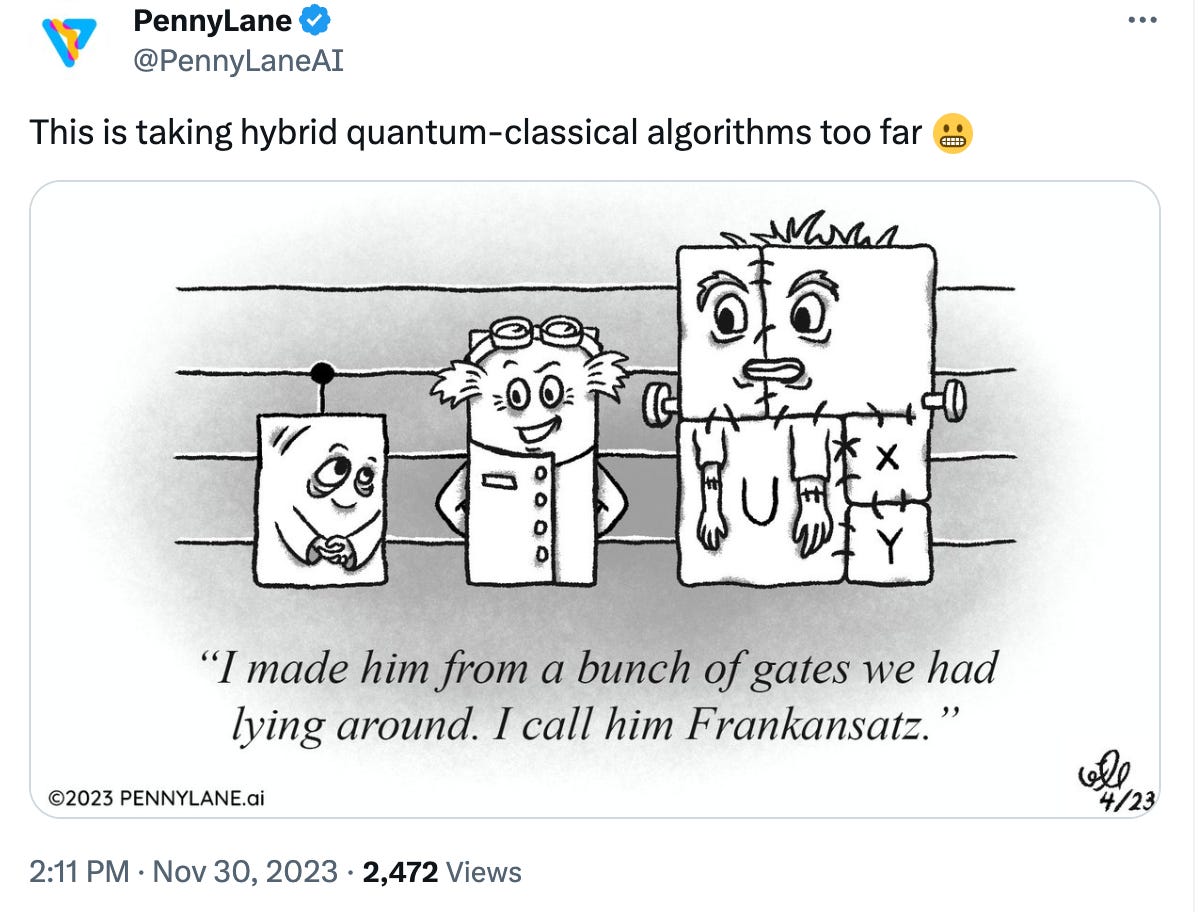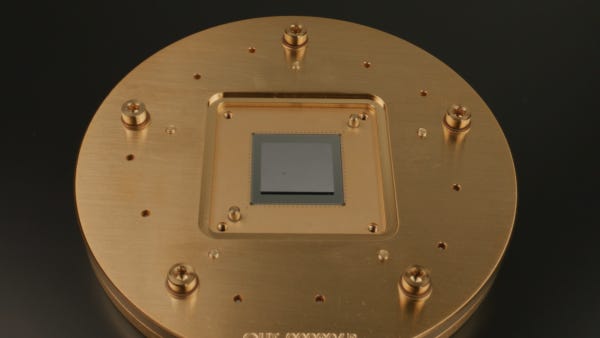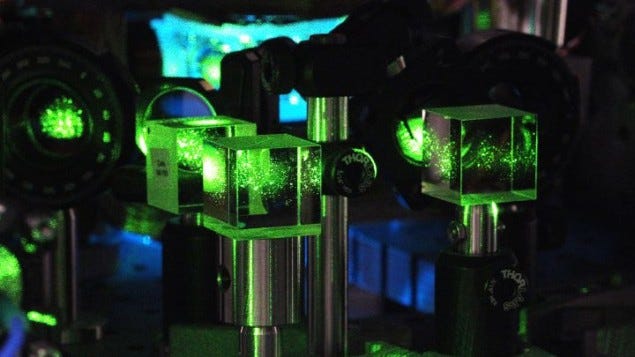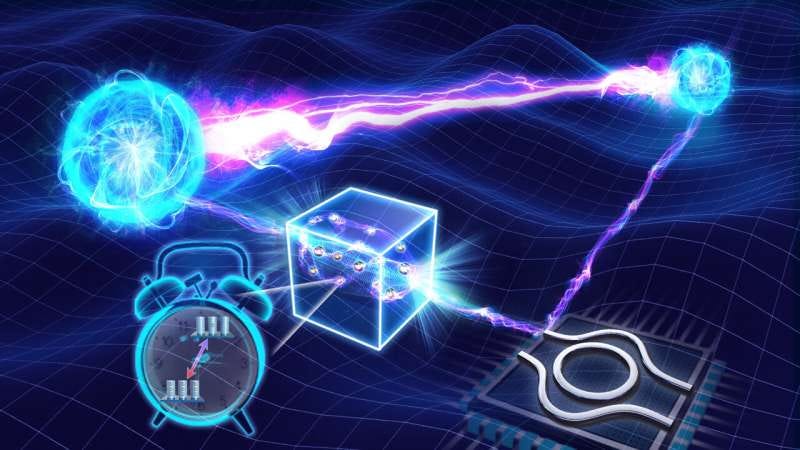The Week in Quantum Computing - December 4th - Oxford Quantum Circuits, Alibaba, AWS, IBM, QSimulate, Q-Ctrl and more
Issue #163
The Week in Quantum Computing. Brought to you by Sergio Gago (@piratecto).
To understand what Quantum computers can and can’t do, it is fundamental to learn computational complexity theory. What is an NP and a P problem. And this is one of the best video explainers:
Tweet of the week, by Pennylane
Quick Recap
Oxford Quantum Circuits launched the first enterprise-ready quantum computing platform, receiving a $100m funding boost. Alibaba closed its QC lab. QSimulate secured $2.5M in funding. PASQAL partnered with Investissement Québec for a $90M project in Sherbrooke. Qiskit is undergoing changes to facilitate community-led development. Q-CTRL integrated its error suppression technology into IBM Quantum services. Zapata Computing partnered with Sumitomo Mitsui Trust Bank.
In the meantime AWS had their yearly re:Invent conference where they had the year with most Quantum talks and announcements (your’s truly was there!) revealed details on their QPU and how they can suppress errors. They also launched Amazon launched Braket Direct to reserve QPU time through Braket. And if you are planning to create a quantum startup, read Christophe Jurczak's from Quantonation paper on the VC state of play in the QC industry.
The Week in Quantum Computing
OQC launches OQC Toshiko, the world’s first enterprise ready quantum platform
Oxford Quantum Circuits (OQC) has publicly launched OQC Toshiko, the world's first enterprise-ready quantum computing platform. The 32-qubit platform has been deployed to commercial data centres, providing businesses worldwide with secure access to quantum technology. In addition to this, OQC announced that Japan's premier VC fund, SBI Investment, is leading a $100m funding round for the company. The funds will be used to further OQC's R&D capabilities in bringing enterprise-ready quantum solutions to businesses globally. OQC's CEO, Ilana Wisby, said that the aim is to "put quantum computers in the hands of humanity and at the fingertips of our most brilliant minds."
https://oxfordquantumcircuits.com/toshiko-the-worlds-first-enterprise-ready-quantum-platform
Alibaba's research arm shuts quantum computing lab amid restructuring
Chinese tech giant, Alibaba, has shut down its quantum computing lab amid restructuring, donating the lab and related equipment to Zhejiang University. The lab was part of Alibaba's DAMO Academy, the company's in-house research initiative. Despite the closure, DAMO Academy will continue to focus on technology research, aiming to lead in artificial intelligence (AI). The affected 30 employees represent a small fraction of Alibaba's overall R&D team, with Zhejiang University planning to recruit them for its own quantum research. This move is part of Alibaba's ongoing internal changes, which previously included plans to split its business into six units and spin-off its cloud division.
QSimulate closes a $2.5 million financing round to boost businesses in Europe and Asia
Quantum Simulation Technologies, Inc. (QSimulate) has secured $2.5M in funding led by 2xN, a quantum technology investment firm. Other participants include UTokyo IPC and Kyoto iCAP. The funding aims to enhance QSimulate's operations in Europe and Asia.
"PASQAL and Investissement Québec Launch $90M Quantum Computing Initiative in Sherbrooke"
PASQAL, a leader in neutral-atom quantum computers, has partnered with Investissement Québec to launch a $90M initiative over five years in Sherbrooke, Quebec. The project, supported by a $15M loan from the Government of Quebec, aims to manufacture and commercialize quantum computers, and conduct research and development within DistriQ, a quantum innovation zone. The initiative is expected to create 53 permanent jobs over five years and establish Sherbrooke as an internationally renowned quantum hub. PASQAL CEO Georges-Olivier Reymond emphasized the project's potential for major technological advancements, especially in sustainable development. The project also includes a $500K contribution to a research chair at the University of Sherbrooke.
A new chapter for Qiskit algorithms and applications
Qiskit is undergoing significant changes to facilitate community-led development of algorithms and applications. Its algorithms have been moved to a standalone package, qiskit-algorithms, allowing for more flexible development cycles. Qiskit's application modules, including qiskit-nature, qiskit-machine-learning, qiskit-optimization, and qiskit-finance, have also been relocated to the qiskit-community GitHub organization. The changes enable external partners to contribute more significantly to the libraries' direction. New maintainers from IBM Quantum partner institutions, including Algorithmiq, STFC Hartree Centre, and Quantagonia, have been onboarded.
https://medium.com/qiskit/a-new-chapter-for-qiskit-algorithms-and-applications-5baff541e826
Q-CTRL Integrates Its Error Suppression Technology into IBM Quantum services
Q-CTRL has integrated its error suppression technology into IBM Quantum. This strategic collaboration between Q-CTRL and IBM aims to enhance quantum computing's reliability by mitigating errors. The partnership signifies a significant stride in the quantum computing industry, as it combines Q-CTRL's advanced error suppression solutions with IBM's robust quantum services.
"AWS Unveils Groundbreaking Quantum Chip and Braket Direct Service at re:Invent 2023, Promises 100x Reduction in Bit Flip Errors"
At the AWS re:Invent 2023 conference, senior vice president Peter DeSantis discussed AWS's advancements in quantum computing, particularly in error correction. DeSantis revealed AWS's internal Quantum Processing Unit (QPU) development work, showcasing a custom-designed quantum chip that reduces bit flip errors by 100x using a passive error correction approach. This development theoretically allows for quantum error correction six times more efficiently than standard methods. DeSantis acknowledged that the journey towards error-corrected quantum computing is still in its early days. AWS also announced a new offering, Braket Direct, expanding customer access to quantum hardware. The company's focus on quantum technology underlines the growing significance of quantum computing and networking in the advanced computational landscape.
AWS re:Invent 2023 - Monday Night Live Keynote with Peter DeSantis
During the Monday Night Live Keynote at AWS re:Invent 2023, Peter DeSantis, a leading figure in Amazon Web Services, delivered a keynote address. The discussion, broadcasted on YouTube, focused on the latest advancements and trends in the field of quantum computing. While the specifics of the talk are not detailed, it's clear that AWS is actively engaging with quantum technologies.
Sumitomo Mitsui Trust Bank and Zapata AI to Collaborate on Financial Modeling
Zapata Computing Inc. has initiated a partnership with Sumitomo Mitsui Trust Bank (SuMiTB). The collaboration aims to model financial time series data utilizing generative AI, bolstered by quantum science.
Neutral-atom quantum computers are having a moment
Neutral-atom quantum computers are gaining prominence in the quantum computing landscape. Atom Computing, a start-up, recently announced it will soon have a 1000-qubit neutral-atom machine ready for customers - the first commercial quantum device to pass this milestone. Other significant developments include three separate studies published in Nature, demonstrating neutral-atom platforms with low noise, new error mitigation capabilities, and strong potential for scaling up. Jeff Thompson, a physicist at Princeton University, who led one of these studies along with Shruti Puri of Yale University, highlighted the importance of error correction in quantum computing, stating it's the frontier of the field and key to performing useful calculations.
https://physicsworld.com/neutral-atom-quantum-computers-are-having-a-moment/
Researchers achieve quantum storage of entangled photons at telecom wavelengths in a crystal
The group led by Prof. Xiao-Song Ma at Nanjing University has made a significant breakthrough in quantum storage, achieving a record-long storage time of almost 2μs for quantum-entangled photons at telecom wavelengths. The success is attributed to the efficient generation of entangled photons combined with long storage time in an ensemble of 167Er3+ ions doped in a Y2SiO5 crystal. This achievement, published in Nature Communications, represents an essential step towards practical large-scale quantum networks. The research team demonstrated the ability to generate high-quality entangled photons at telecom frequencies and store the entangled state on a solid-state platform, paving the way for the future quantum internet.
https://phys.org/news/2023-11-quantum-storage-entangled-photons-telecom.html
CUDA Quantum 0.5 Delivers New Features for Quantum-Classical Computing
NVIDIA's CUDA Quantum 0.5 introduces new features for quantum-classical computing applications. The open-source programming model, compatible with Quantum Processor Units (QPUs), GPUs, and CPUs, optimizes workflows like quantum simulation and quantum machine learning. The update includes more QPU backends and simulators, supporting adaptive quantum kernels and additional kernels for quantum chemistry simulations. It also offers improved support for std::vector and arrays, and for-loop execution on quantum hardware backends. CUDA Quantum now integrates with QPUs from IQM and Oxford Quantum Circuits, joining existing support for Quantinuum and IonQ. The release also enhances Tensor network simulation and introduces a Matrix Product State simulator.
Singtel to develop Singapore’s first Nationwide Quantum-Safe Network Plus for enterprises
Singtel, a leading telecommunications company, is set to develop Singapore's first Nationwide Quantum-Safe Network Plus, a significant step towards quantum-safe communications for enterprises. This innovative move will ensure secure connectivity and robust network infrastructure in the era of quantum computing. The project is a testament to Singtel's commitment to pioneering advanced technology solutions to meet the evolving needs of its enterprise customers. The main implication of this development is the potential for increased security in digital communications, a critical aspect in the rapidly advancing landscape of quantum technology.
Paper: Comparison between Tensor Networks and Variational Quantum Classifier
Georgios Laskaris, Artem A. Melnikov, Michael R. Perelshtein, Reuben Brasher, Thomas Baeck, and Florian Neukart conducted a comparative analysis of Tensor Networks (TN) and Variational Quantum Classifiers (VQC). The researchers found that VQC outperforms TN in speed and accuracy with data featuring a small number of features. However, TN surpasses VQC in classification accuracy for high-dimensional data, likely due to challenges in training quantum circuits. The authors caution against broad generalizations from this study, emphasizing its focus on a specific task without extensive averaging of results.
https://arxiv.org/abs/2311.15663v1
Defining logical qubits: Criteria for Resilient Quantum Computation
As an industry, we are all collectively committed to bringing scaled quantum computing to fruition. Understanding what it will take to reach this goal is crucial not just for measuring industry progress, but also for developing a robust strategy to build a quantum machine and a quantum-ready community. That’s why in June 2023, we offered how quantum computing must graduate through three implementation levels to achieve utility scale: Level 1 Foundational, Level 2 Resilient, Level 3 Scale. All quantum computing technologies today are at Level 1, and while numerous NISQ machines have been developed, they do not offer practical quantum advantage. True utility will only come from orchestrating resilient quantum computation across a sea of logical qubits — something that, to the best of our knowledge, can only be achieved through fault tolerance and error correction. And it has not yet been demonstrated.
Paper: Investing in the Quantum Future : State of Play and Way Forward for Quantum Venture Capital
Christophe Jurczak's research paper, "Investing in the Quantum Future: State of Play and Way Forward for Quantum Venture Capital," underscores the role of venture capital (VC) in the transition of quantum technology from the lab to commercial use. As quantum science applications in computing, sensing, and networks emerge, VC, in conjunction with public funding, is instrumental in supporting startups and shaping ecosystem priorities. The paper cites Quantonation I, the first dedicated quantum fund, as a case study, demonstrating its influence on scientific knowledge production, job creation, and industry funding. Jurczak advocates for increased funding for scale-up quantum companies and societal involvement, and calls for collaboration on projects with high societal benefits.
https://arxiv.org/abs/2311.17187v1
My Quantum Computing Wish List for Christmas 2023 and New Year 2024
In a recent piece by Jack Krupansky, he outlines his wish list for quantum computing advancements in 2024. His primary desire is a small quantum computer with 48 fully-connected near-perfect qubits capable of supporting a 20-bit quantum Fourier transform (QFT) and enabling quantum phase estimation (QPE). This, he believes, could demonstrate a quantum advantage of one million to one over a comparable classical solution. Krupansky asserts that meeting these specifications would be a significant step forward for the quantum computing sector, providing substantial value for a broad range of applications. He also anticipates that if these advancements aren't feasible by the end of 2025, a "Quantum Winter" may be imminent.
Science Committee Passes Bills to Secure Quantum & Commercial Space Leadership
The House Committee on Science, Space, and Technology has passed two significant bills aimed at ensuring America's leadership in quantum sciences and strengthening the commercial space sector. Chairman Frank Lucas highlighted the importance of H.R. 6213, which builds upon the 2018 National Quantum Initiative Act, emphasizing the need to maintain momentum against notable investments by China and Russia in quantum systems. The second bill, H.R. 6131, is designed to support America's commercial space economy through streamlining regulations and promoting best practices. Lucas stressed the bills' development through significant stakeholder input and strong support, underscoring their potential success in advancing these industries.








